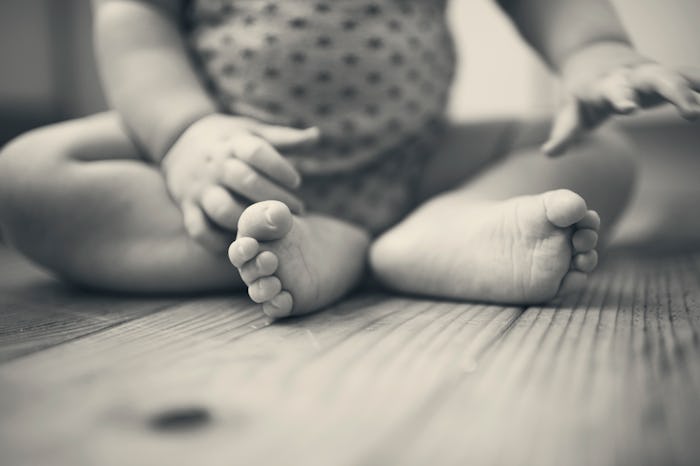Life

Can Quarantine Impact Baby's Development? Here's Some Reassuring Info
If you are quarantining with a baby, you're probably getting a really close look at how quickly they're changing as the time goes on. Their mental and physical growth over the first year of life is incredible, but can social isolation affect a baby's development? Since circumstances are far from ordinary right now, it's a fair question to ask.
In a pre-COVID-19 world, your baby may have been exposed to their peers at day care, a nanny share, or just from mommy-and-baby play dates. But now that they're at home all the time, things are a bit different. There's no need to panic, though, because all of this social isolation won't impact their continued development. "Children are resilient," pediatrician Dr. Whitney Casares, M.D., M.P.H., tells Romper via email, "[and] they can maintain their developmental progress even when quarantined or when receiving at-home care." Dr. Dyan Hes, M.D., a pediatrician in New York, agrees. In an email to Romper, she explains that "a parent or sibling interacting with a baby will be sufficient for them to learn and grow emotionally."
Although you don't need to try to step into the role of their day care teacher, Hes does note that parents should still be somewhat proactive with their baby's development during this time. "Parents who are home with their children during quarantine need to know what milestones occur at each age group," she says, "this way they can focus on honing those skills, whether it be rolling over, sitting up, or using a fork." Additionally, if your baby is a little older and was in day care before quarantine started, she recommends closely "monitoring proper speech development, fine and gross motor skills" while they're at home.
As for their social development, there's no need to worry. "Outside child care opportunities can be a great way for babies to socialize," but it really isn't necessary, explains Casares. It isn't until age 2 when children "especially benefit from learning directly from their peers." And you may have even noticed that if you stick your 1- or 2-year-old next to another child of that age, they may hardly acknowledge each other, much less interact, a phenomenon known as parallel play. Hes says it isn't until age 3 that "children begin to play together," so your energy will be much better spent working on the bigger milestones. However, if you're still concerned about socialization, Casares recommends getting in some one-on-one playtime with your baby, without distractions, as much as possible.
Your baby's development is going to keep moving along, whether they are in quarantine or not. By simply engaging with them and being mindful of where they should be developmentally, you're doing as much for them as day care would.
Experts:
Dr. Whitney Casares, M.D., M.P.H., pediatrician, author of The New Baby Blueprint: Caring for You and Your Little One, and founder of www.modernmommydoc.com
Dr. Dyan Hes, M.D., pediatrician and medical director of Gramercy Pediatrics in New York City
This article was originally published on